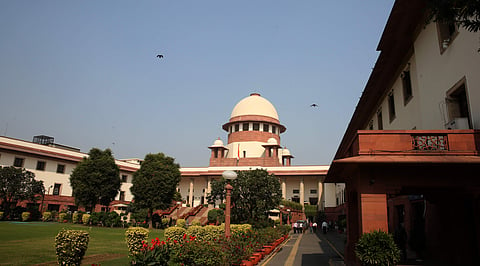

Today, July 14, Thursday, the Supreme Court of India refused urgent hearing of a PIL which sought a direction to the Centre as well as the states for the implementation of a common dress code for students and staffers in registered educational institutions for securing equality and promoting fraternity and national integration.
A bench headed by Chief Justice N V Ramana was urged by lawyer Ashwini Upadhyay that his PIL also be listed for hearing like the batch of appeals filed against the verdict of the Karnataka High Court on the hijab row.
It may be recalled that on July 13, Wednesday the bench comprising justices Krishna Murari and Hima Kohli had taken note of the submissions of lawyer Prashant Bhushan and agreed to list the petitions challenging the Karnataka High Court verdict refusing to lift the ban on hijab in educational institutions of the state next week.
At the outset, Upadhyay said this is a matter pertaining to the common dress code.
"We have told you a number of times. Do not force me to repeat. Every day you file a PIL. How many matters have you filed? As if there is no regular litigation. I do not know, in every case you come and mention. It will come in due course. Wait...," the bench said.
"Your Lordship agreed to hear the hijab matter yesterday. I filed this PIL in February," Upadhyay said.
Earlier in the year, in February, the PIL was filed by Nikhil Upadhyay through lawyers Ashwini Upadhyay and Ashwani Dubey in the apex court which sought the implementation of a common dress code in educational institutions in the light of the hijab row.
The plea has also sought a direction to the Centre to set up a judicial commission or an expert panel to suggest steps for inculcating values of "social and economic justice, socialism secularism and democracy and to promote fraternity dignity unity and national integration among the students."
"Alternatively, being custodian of the Constitution and protector of fundamental rights, direct the Law Commission of India to prepare a report suggesting steps to secure social equality and to promote fraternity dignity unity and national integration within three months," it said.
Besides the Centre, states and the union territories, the PIL has made the Law Commission a party and sought a direction to respondent authorities, "to strictly implement a common dress code for staff and students in all the registered and recognised educational institutions in order to secure equality of status and social equality and to promote fraternity dignity unity national integration."
The plea said that a common dress code is necessary to maintain a sense of uniformity, but it also helps instil a sense of camaraderie among students from different caste, creed, faith, religion, culture and place.
It referred to the dress code in countries like the US, the UK, France, Singapore and China and said, "according to a survey, around 2,50,000 guns were brought in schools and colleges in 2018. So, having a common dress code that requires a student's beltline exposed reduces the fear of a concealed weapon."
